Summer reads
1 Aug 2022
LMU researchers and students share their summer reading recommendations.
1 Aug 2022
LMU researchers and students share their summer reading recommendations.
Hefty page-turners and outlandish tales, but also literature about the origin of humanity and the road to stress-free work: The following tips are sure to contain a summer read to suit every taste.
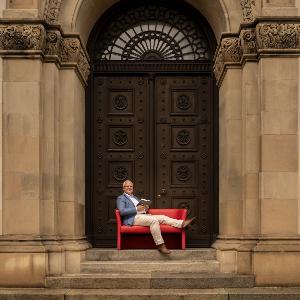
should be a page-turner, says Oliver Jahraus. And besides: exciting, colorful, exotic. | © LMU
„As a literary scholar, giving just one reading tip goes against my nature. But fine, I’ll play along … and think back to a formative reading experience as a teenager under the shade of a tree in our garden. The book is a page-turner, exciting, colorful, exotic – and above all thick. Almost 1,500 pages in the unabridged German paperback edition – that’s all to the good. I’m talking about The Count of Monte Cristo by Alexandre Dumas, which appeared in instalments between 1844 and 1846 (akin to a hit Netflix series in the days before Netflix). The book is a beach read, an adventure story, an historical yarn, a social novel – but most of all a glorious revenge story (up there with Kill Bill).
Aspiring young naval officer Edmond Dantès has a happy future ahead of him: He has the opportunity to become captain and marry the enchanting Mercedes. But an intrigue concocted by some villains sees him cast into a dungeon on a gloomy prison island forever. He manages to escape and takes possession of a vast treasure that a fellow prisoner tells him about. His journey takes him from the wildly romantic criminal underworld in Italy to Parisian high society. He transforms himself into the mysterious Count of Monte Cristo, his wealth is (almost) immeasurable, and his revenge – a very satisfying reading experience – is (almost) merciless.“
Prof. Oliver Jahraus is Vice President for Teaching and Studies and Chair of Modern German Literature and Media.
Alexandre Dumas: Der Graf von Monte Christo
Recommended by Professor Oliver Jahraus

“The book is a sober caution about the sway of xenophobic nationalism,“ says Sahana Udupa. | © LMU
"Insightful and provocative, this book is a must read for those interested in understanding the lived worlds of troubled ideologies. The Management of Hate is based on author Nitzan Shoshan’s observations and interactions with the youth in East Berlin who had come to embrace ideas of racist nationalism, sometimes by nostalgically harping back to the country’s Nazi past.
The author does not just analyze what these young extremists say but spends extensive time with them to understand their worlds. The book simultaneously opens up questions of governance and state’s policies to “manage” extremist youth.
Management of Hate shows how a fine ethnography with long term engagement and unswerving commitment to fieldwork can generate precious knowledge about pressing matters of our times. It demonstrates the merits of qualitative research in illuminating aspects that other modes of inquiry fail to grasp. The book is a sober caution about the sway of xenophobic nationalism, and how a close understanding can offer valuable pathways to intervene imaginatively."
Sahana Udupa Professor of Media Anthropology at LMU Munich’s Institute of Social and Cultural Anthropology,
Nitzan Shoshan: The Management of Hate: Nation, Affect, and the Governance of Right-wing Extremism in Germany
Recommended by Prof. Sahana Udupa
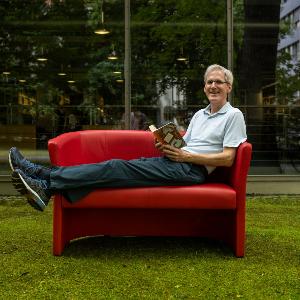
are those in which at the end nothing is as it seemed at the beginning,“ says Dirk Erfurth. | © LMU
"The best books on my shelves are those in which at the end nothing is as it seemed at the beginning. Chapter by chapter, we see various convictions and rickety thought constructions collapse in on themselves. When all this is wrapped up, moreover, in a humorously absurd narrative, in which one comical adventure follows on the heels of another, then a refreshing, enjoyable read is guaranteed.
In The Hundred-Year-Old Man Who Climbed Out the Window and Disappeared, Jonas Jonasson relates with subtle wit how his protagonist Allan Karlsson thumbs his nose at demographic conventions. On his three-figure birthday, he finally has enough of brown felt slippers and pansy beds. Is life to go on like this forever?
So Allan decides to break out of his retirement home. His clicking knees are still in decent shape, and even his mistrustful sister Alice, who in the past had always found the bottle of liquor in his room, arrives too late this time. No sooner has Allan left his supposedly age-appropriate life behind him than he meets all kinds of different characters and gets caught up in increasingly outlandish events. And so the author spins an uplifting yarn right to the last page.
Dirk Erfurth is Head of Career Services at LMU.
Jonas Jonasson: Der Hundertjährige, der aus dem Fenster stieg und verschwand
Recommended by Dirk Erfurth
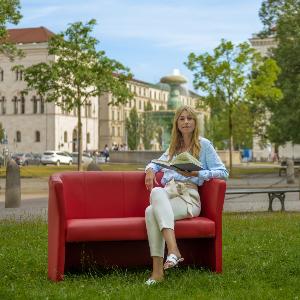
Marta Diepenbroek recommends the book “Who we are and how we got here“. | © LMU
"Even though I’ve been working in forensics for over 10 years, crime in books or movies never got boring for me. I believe that for many readers, the most popular summer read is the one that has some mystery to it! Nothing more exciting than a good crime story, right?
I am about to change your mind – there are stories more thrilling than any book by Stephen King! Stories that concern the biggest mystery of all – the riddle of us, humans.
The book Who we are and how we got here by David Reich takes you on a journey to our origins and presents it from the most modern side – that of DNA studies. Reich, an outstanding scientist works with ancient DNA, to explain the history of humankind in a way you have never heard before and will surprise you with how different but similar we all are.
This book is a mixture of history and science and there is nothing more exciting than how they come together to help understand who we are."
Dr. Marta Diepenbroek is a forensic scientist at the Institute of Legal Medicine.
David Reich: Who we are and how we got here
Recommended by Dr. Marta Diepenbroek

for Celine Edinger: “Alte Sorten“ by Ewald Arenz. | © Mayla Wind
"For me, Alte Sorten – the title means ‘old varieties’ – by Ewald Arenz is perfect summer reading! With the sweet scent of pears in the nostrils, you plunge into a story full of tenderness about two women who have a chance encounter, from which a close relationship gradually develops.
Teenager Sally has had enough of the world. She is hurt, lonely, and just wants to be left alone. Liss gives her space. On Liss’s old farmstead among chickens, bees, and homemade bread, the two women get along without the need for much talking – they work, eat, and sleep according to natural rhythms. In the course of the summer, they reveal their wounds to each other and help one another get over their pain. They forge a connection that you can really feel between the lines.
A tender relationship, vineyards in full bloom, juicy fruit, and fresh country air – and all between the covers of a book 228 pages long, which fits in any beach bag – what more could you want from a summer read?"
Celine Edinger is completing a master’s degree in sociology.
Ewald Arenz: Alte Sorten
Recommended by LMU student Celine Edinger
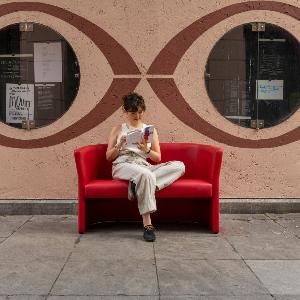
by findings from neuroscience and psychology on how the physical world and our corporeal experiences shape the process of learning and knowledge transfer: Annie Chan | © LMU
"This book is particularly exciting to read now — in the first summer we find ourselves once again mobile and interacting in person — because it synthesizes a body of research that serves to illustrate how confinement and virtual modes impact communication, creativity, and efficacy.
Many of us in the scientific field are so accustomed to ascribing mental tasks solely to our minds that we limit the locus of thinking and analytical work to the screens of our computers and solitary sittings. Cerebral academic work appears to be an ideal pandemic occupation but results from neuro- and behavioral sciences are showing us that our thoughts do not exactly originate in our heads, they are derived from sensory inputs and other contextual information, which means we could manipulate our environment to think differently — and perhaps more effectively and “outside the box”. I have been test-driving some of the practices introduced in the book and discovering the benefits of thinking outside my head by experimenting with different setups that alter motor habits. As an archaeologist who studies how physical and social mobility conditions human behavior in the past, I am always captivated by findings from neuroscience and psychology on how the physical world and our corporeal experiences shape the process of learning and knowledge transfer.”
Dr. Annie Chan is Assistant Professor (Wissenschaftliche Assistentin) at LMU’s Institute of Sinology and Researcher in Residence at Center for Advanced Studies.
Annie Murphy Paul: The Extended Mind: The Power of Thinking Outside the Brain
Recommended by Dr. Annie Chan
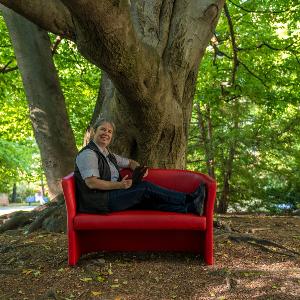
recommended by Gitta Kutyniok shows how women, from their position in the background, were essential for the success of the first moon landing. | © LMU
“As a mathematician and computer scientist, the true story behind the book Hidden Figures: The Untold Story of the African American Women Who Helped Win the Space Race has always deeply moved me. And as the term “hidden figures” often still applies to this day, I would most warmly recommend this utterly fascinating read to everyone.
The story takes place in the run-up to the first moon landing by NASA, when there weren’t any supercomputers like today, but calculations of things such as flight paths had to be done laboriously by hand. Many of the “human computers,” as they were known, who did these calculations were women – and often of African American origin, including the brilliant mathematician Katherine Johnson. The book not only shows how these women, from their position in the background (hidden), were absolutely essential for the success of the first moon landing, but also how they gradually obtained the recognition of their male colleagues through their excellence. In this way, they prompted a rethink within NASA in relation to female African American scientists in particular.
And for those who prefer to watch movies, I should add that a very successful film was created out of an admittedly very condensed version of the book. The film is also to be recommended.”
Prof. Gitta Kutyniok is Chair of the Mathematical Foundations of Artificial Intelligence at LMU.
Margot Lee Shetterly: Hidden Figures: The Untold Story of the African American Women Who Helped Win the Space Race
Recommended by Professor Gitta Kutyniok
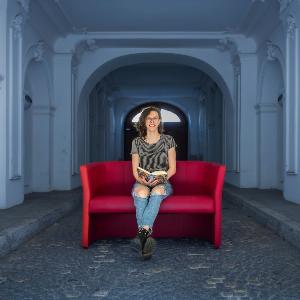
Lisa Stengele recommends Identitti. | © LMU
"For a seminar, I read the novel Identitti by Mithu Sanyal, which really impressed me and that I could scarcely put down. Although steeped in literary and cultural theory, the novel is not didactic. Without finger-pointing, Mithu Sanyal (who holds a doctorate in postcolonial studies) writes about the problems of cultural appropriation and the feigning of identity. In the process, she raises the question of the fixity and singularity of identity, sending readers on a quest for answers together with the protagonist Nivedita.
In particular, the incorporation of different ‘voices’ – Sanyal quotes academics, allows real people to give their opinions, includes tweets and blogposts – makes the novel such a well-rounded reading experience."
Lisa Stengel studies "Deutsch als Fremdsprache" and is co-founder of the Lesebuddies reading community.
Mithu Sanyal: Identitti
Recommended by LMU student Lisa Stengel

The book recommended by Ophelia Deroy takes us back 12,000 years ago. | © LMU
“57% of the global population now lives in cities. 70% will do so by 2050. We must see that our shared history has been to move to cities and figure out how to make them work. The book The Dawn of Everything. A New History of Humanity by David Wengrow and David Graeber provides the best historical perspective here, as it tells how the transition to agriculture affected human history.
The book takes us back 12,000 years ago, as some humans started to transition from living in small bands of hunter-gatherers, following migratory herds and foraging on nuts and berries, to being permanent settlers, harvesting and storing crops. Over the next thousand years, agriculture transformed humanity – humans built cities, developed new forms of religion and arts, and lived in larger groups. But, less obviously, agriculture also meant a new way of taking collective decisions: in many cases, it required social hierarchies, armies, and professional rulers and administrators. Undoubtedly, the new cities are different from the early urban settlements. But they are also made necessary and possible because of new technologies: not agriculture, but AI and more generally computing.
Aren’t these new technologies just a moment in another historical shift that started 12,000 years ago – taking us not from nomadism to settlement but from material to dematerialised ways of living and interacting? Do we want these changes, and what kind of new power distribution goes with them? This is the big question that the book by Wengrow and Graeber should help me think about.
I like to read big books during the summer: You have time to get absorbed in them, and it is easier to pack one big book than 4 small ones ! (To be honest, I will also get at the audiobook version of Werner Herzog’s recent book in my summer bag. Amusingly, it is called The Twilight World, which is a fun match for the Dawn of history. It is about a Japanese soldier who defended a small island in the Philippines for twenty-nine years after the end of World War II … But this is now taking us elsewhere!)“
Prof. Dr. Ophelia Deroy holds the Chair in Philosophy of Mind at LMU.
David Wengrow and David Graeber: The Dawn of Everything. A New History of Humanity
Recommended by Prof. Ophelia Deroy
"Once I received the request from the LMU Newsroom for a reading recommendation, I had five days to choose a book to write about. The days flew by in a blur of appointments and commitments, and I couldn’t decide between the three books I’d read most recently (Lessenich 2019, Meyer 2014, Tsing 2015).
Then, on the evening before the deadline, I came to the conclusion that there was just one book I would currently like to recommend as summer reading: David Allen’s Getting Things Done; a classic of self-management literature. I urge the book upon anyone who wants to optimize their work processes without stress and acquire fresh ideas to prepare themselves for the coming winter semester. What a refreshing prospect, to emerge from the summer haze well organized and with a complete overview of the projects that can lead you into procrastination. I myself have been using the techniques for years, to help me work in a more productive and sustainable manner. With the audio book on my headphones over the next few weeks, I will think about upcoming projects in a more relaxed frame of mind. Wishing everyone a lovely, stress-free summer!”
Diana Gabler is a doctoral researcher in the “Indigeneities in the 21st century” project at the Institute of Social and Cultural Anthropology at LMU.
David Allen: Getting Things Done
Recommended by Diana Gabler